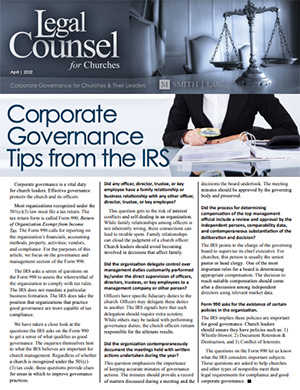Corporate governance is a vital duty for church leaders. Effective governance protects the church and its officers.
Most organizations recognized under the 501(c)(3) law must file a tax return. The tax return form is called Form 990, Return of Organization Exempt from Income Tax. The Form 990 calls for reporting on the organization’s financials, accounting methods, property, activities, vendors, and compliance. For the purposes of this article, we focus on the governance and management section of the Form 990.
The IRS asks a series of questions on the Form 990 to assess the wherewithal of the organization to comply with tax rules. The IRS does not mandate a particular business formation. The IRS does take the position that organizations that practice good governance are more capable of tax compliance.
We have taken a close look at the questions the IRS asks on the Form 990 to get a sense of what qualifies as good governance. The inquiries themselves hint to what the IRS believes are important for church management. Regardless of whether a church is recognized under the 501(c)(3) tax code, these questions provide clues for areas in which to improve governance practices.
Did any officer, director, trustee, or key employee have a family relationship or business relationship with any other officer, director, trustee, or key employee?
This question gets to the risk of interest conflicts and self-dealing in an organization. While family relationships among officers is not inherently wrong, these connections can lead to trouble spots. Family relationships can cloud the judgment of a church officer. Church leaders should avoid becoming involved in decisions that affect family.
Did the organization delegate control over management duties customarily performed by/under the direct supervision of officers, directors, trustees, or key employees to a management company or other person?
Officers have specific fiduciary duties to the church. Officers may delegate these duties to another. The IRS signals here that such delegation should require extra scrutiny. While others may be tasked with performing governance duties, the church officers remain responsible for the ultimate results.
Did the organization contemporaneously document the meetings held with written actions undertaken during the year?
This question emphasizes the importance of keeping accurate minutes of governance actions. The minutes should provide a record of matters discussed during a meeting and the decisions the board undertook. The meeting minutes should be approved by the governing body and preserved.
Did the process for determining compensation of the top management official include a review and approval by the independent persons, comparability data, and contemporaneous substantiation of the deliberation and decision?
The IRS points to the charge of the governing board to supervise its chief executive. For churches, this person is usually the senior pastor or head clergy. One of the most important roles for a board is determining appropriate compensation. The decision to reach suitable compensation should come after a discussion among independent directors using relevant market data.
Form 990 asks for the existence of certain policies in the organization.
The IRS implies these policies are important for good governance. Church leaders should ensure they have policies such as: 1) Whistle-blower, 2) Document Retention & Destruction, and 3) Conflict of Interests.
The questions on the Form 990 let us know what the IRS considers important subjects. These questions are asked to help churches and other types of nonprofits meet their legal requirements for compliance and good corporate governance.

